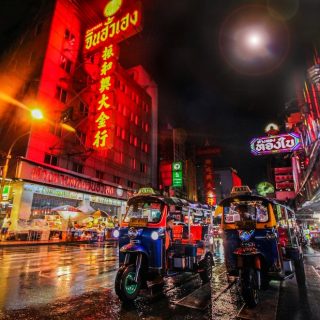Featured Posts
- News
World News Roundup: Borders, Breakdowns & Boiling Points
The latest news and trends from around the world
- Expeditions
A Serengeti Dream Season
Inside the most extraordinary months on the plains
- Bali
Want to Live in Bali Permanently? Here’s How
Everything you need to make your island move stable, legal, and joyful.
- Belize
Belize’s Offshore Banking Advantage
Why investors are paying attention to Belize’s evolving offshore landscape
- Interview
The Veteran Rewriting His Life Abroad
What one former soldier learned about healing, identity, and living abroad after the uniform comes off
- Real Estate
Considering Mexico? Try San Cristóbal de las Casas
Finding peace, purpose, and connection in Mexico’s most soulful highland city
- Asia-Pacific
Tuvalu: The Island Uploading Itself to the Metaverse
Tuvalu faces rising seas with an unthinkable plan—digitizing an entire nation
Plan B
All the information you need to make the move overseas
- Plan B
Your 2025-2026 Guide to Which Countries Offer Retirement Visas
Introduction If you’re asking which countries offer retirement visas you’re tapping into a shift that’s gaining real momentum. More retirees than ever leave their home turf not just for a…
- Plan B
The Financial Case for Building a Life Abroad
It often starts subtly. Someone runs the numbers after another year of rising expenses or spends a week abroad and realizes how different life feels when the cost of living doesn’t hover over…
- Plan B
A Modern Blueprint for Retiring Abroad
The Dawn of a New Retirement For decades, retirement was imagined as a fixed point in time, something that happened only after a full career had run its course. It followed a script that…
- Plan B
The New Path for American Expats
If you’re an American thinking about living abroad, that idea usually blooms from a simple feeling: life could feel different somewhere else. Maybe mornings could begin with sea air instead of…
Sign up for the EA Newsletter
Get important news delivered directly to your inbox and stay connected!
Global Roundup
Trending Posts
- Interview
The Veteran Rewriting His Life Abroad
What one former soldier learned about healing, identity, and living abroad after the uniform comes off
- Belize
Belize’s Offshore Banking Advantage
Why investors are paying attention to Belize’s evolving offshore landscape
- United Kingdom
The Mass Migration Out of London
Where did ex-Londoners move, and why?
- Expeditions
A Serengeti Dream Season
Inside the most extraordinary months on the plains
- Plan B
The Financial Case for Building a Life Abroad
It might actually become your best investment.
- Plan B
Your 2025-2026 Guide to Which Countries Offer Retirement Visas
Explore global destinations where retirement visas are available.
- Costa Rica
Costa Rica Homes for Rent: Best Areas, Prices, and Tips for Expats
Explore rentals and expat housing options across Costa Rica
Interviews
Insightful Q&As with travelers and expats from around the globe
- Interview
The Veteran Rewriting His Life Abroad
John H. Davis has lived more than one lifetime. He served in the U.S. Army, deployed to war, rebuilt himself through higher education, earned a master’s degree from Harvard, and then, when the…
- Interview
The Art of Building Walls
It’s close to 3 a.m. in Virginia, and Mike Cobb is on the road again. In a few hours, he will board a flight to Panama for an international conference, with a side itinerary that feels very…
- Interview
Inside the Life of a Solo Mother Traveling the World
For German native Sarah Noack, motherhood never meant standing still. Three years ago, she set out on a journey that would redefine both travel and parenthood—becoming a solo mother traveling…



































